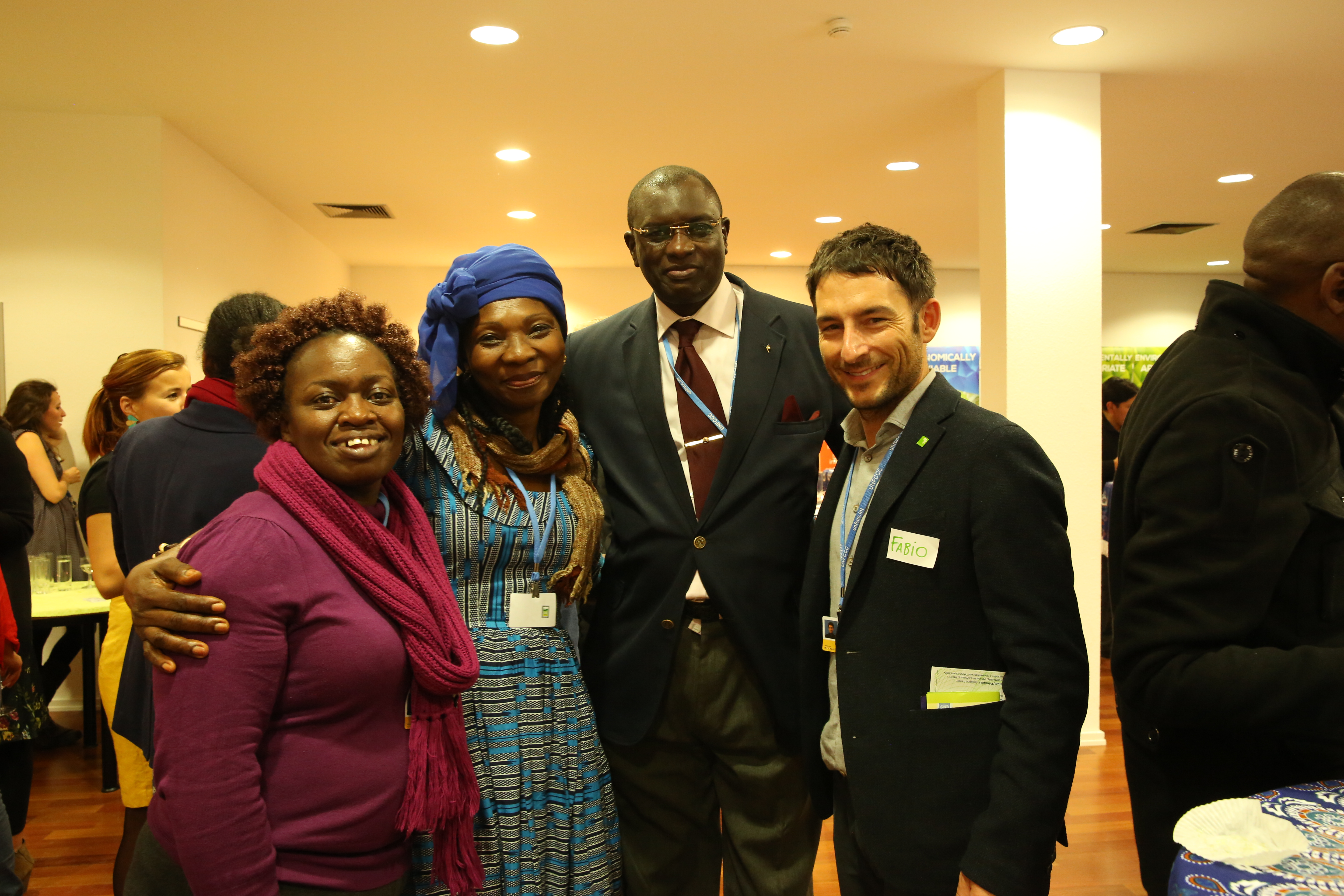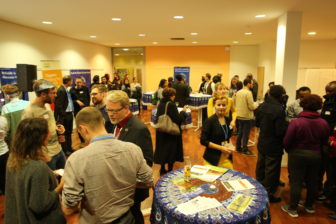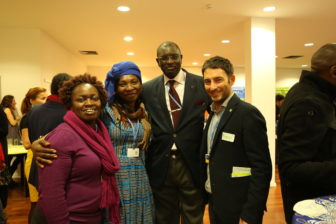Regeneration International: Report and Lessons from COP23
Regeneration International (RI) sent a small delegation to the COP23 Climate Summit in Bonn, Germany. Our delegation consisted of: a German-French, an English-French, a Zimbabwean and an Argentine. What sounds like the beginning of a joke—a German, an Englishman, a Zimbabwean and an Argentine walk into a bar—turned out to be a great combination of different skill sets, languages, cultures, experiences . . . and lots of porridge for breakfast.
The RI team set off for the COP23 Climate Summit with a clear mission and some concrete goals:
- To film and document experiences of best practitioners and official delegations pushing for a regenerative agenda and for initiatives looking to better the soil, health and livelihood of communities.
- To organize side events focused on the role of women in fighting climate change.
- To follow closely the official negotiations related to agriculture.
- To participate in the 4 per 1000: Soils for Food Security and Climate Initiative day to learn more about the initiative and how we can help facilitate democratic, inclusive participation in its constituency.
- To organize an informal gathering, outside the COP23 venue, for farmers, producers, activists, policymakers and media.
- To document positive outcomes that could signal progress from previous COPs, but also to identify red flags, setbacks and potential threats.
We’re pleased to report that we obtained some good results:
- Filming and documenting. RI interviewed Barbara Hachipuka Banda, from Shumei, who teaches small scale women-farmers about “natural agriculture,” covered a story on how millions of farmers are using trees to regenerate vast swaths of land across Africa, talked to the Ministry of Environment, Forest and Climate Change in Ethiopia about Ecosystem Restoration, and discussed the fundamental issue of the supersized climate footprint of Big meat and Dairy.
- Organization of side events. RI co-organized, with WECAN, side events where grassroots and indigenous women leaders shared their experiences, actions and defense of forests and biodiversity, their advocacy for regeneration and agroecological implementation, their resistance against fossil fuels and their defense, in every place and time, of rights of nature.
- Strong participation in 4 p 1000 meetings. RI attended the 4 per 1000 Initiative’s second Meeting of the Forum in Bonn on November 16, 2017. (We also attended the first meeting, held in November last year at the COP22 summit in Marrakesh, and a funding meeting in Meknes, Morocco, in April 2016. Our reports are here and here.
The mission of the 4 per 1000 Initiative, according to its website, is “to help member countries and organizations to develop projects, actions and programs based on scientific knowledge that lead to the protection and increase of stocks of soil organic carbon (SOC) at an ideal rate of 4/100 (0.4%) per year.”
This most recent meeting included a high-level segment in the morning, with agricultural ministers from several countries, including: the new French Minister (in a clear gesture from the new French government of the continuation of French support to the initiative); Spain, one of the biggest financial allies in support of the initiative; and Hungary and Tunisia. FAO Director Eduardo Mansur, UNCCD lead scientist Barron Orr, and several others also spoke at the meeting.
Highlights from the 4 per 1000 meeting include:
- Familiarization with the research priorities of the 4 per 1000 Scientific and Technical Committee, which include a focus on soil organic carbon sequestration and its role in reducing global climate change, how to estimate SOC storage potential, the development of management practices, and how to monitor, report and verify results.
- The committee has also developed a set of reference criteria and indicators to assess regenerative projects identified by members of the consortium, which could eventually qualify for funding so that they can be improved and expanded.
- Unveiling of the new 4 per 1000 website which includes more information on the role and structure of the consortium of governance of the initiative, the forum of partners, the scientific and technical committee, and ways to participate.
- Co-Organization of “Speed up the Cool Down” event. On November 15, Biovision, IFOAM Organics International, Shumei International, Terra Genesis International and RI organized a Speed up the Cool Down event. Over 50 people, including farmers, climate justice activists, indigenous and women’s rights advocates, agroecologists, and the growing regenerative agriculture movement came together at IFOAM Organics International Headquarters to learn and collaborate on ways to reverse climate change.
The event allowed RI to provide a positive communication space for a growing network of regenerators who are putting carbon back into the ground and doing it in a sustainable and natural way using organic regenerative farming and land-use practices.
Positive outcomes, potential threats
As with past climate summits, COP23 revealed what’s going right with the climate movement, and what’s not—the proverbial case of the good, the bad (or in this case, neutral) and the ugly.
We identified a few positive (“the good”) outcomes, including:
- Adoption of the Koroniva Joint Work on Agriculture. After COP 17 brought agriculture into the negotiations, the Subsidiary Body for Scientific and Technological Advance (SBSTA), a technical body of the United Nations Framework Convention on Climate Change (UNFCCC) was asked to give recommendations on agriculture during in-session workshop and meetings.
The Koronivia Joint Work on Agriculture will work with the SBSTA and the UNFCCC’s Subsidiary Body of Implementation (the SBI) to address issues related to agriculture, so that the issue of agriculture as a climate solution moves beyond the scientific and technical aspects to implementation.
The focus of the Koronivia Joint Work on Agriculture includes:
- Modalities for implementing the outcomes of the in-session workshops organized over the past years.
- Methods and approaches for assessing adaptation, adaptation co-benefits and resilience.
- Improved soil carbon, soil health and soil fertility under grassland and cropland as well as integrated systems, including water management.
- Improved nutrient use and manure management towards sustainable and resilient agricultural systems.
- Improved livestock management systems.
- Socioeconomic and food security dimensions of climate change in agriculture.
RI will join countries, stakeholders and other observer organizations in submitting recommendations before the next session of subsidiary bodies in April-May 2018.
- Creation of the Tanaloa Dialogue. This is a space created in Bonn to give room to inclusive and participatory processes that allow governments, civil society, private sector and researchers to share stories and showcase best practices on how to raise the bar for nationally determined contributions (NCDs). This could turn out to be a positive development, depending on how it’s implemented and whether the private sector attempts to co-op it.
- Adoption of a gender platform. This platform, which includes a gender action plan and a local communities and indigenous peoples platform, was operationalized with the goal to strengthen the knowledge, technologies, practices, and efforts of local communities and indigenous peoples related to address climate change.
- Syria joined the Paris Climate Accord. That makes the U.S. the only country in the world to opt out of the global climate agreement.
In addition to the above “good” outcomes, we observed a few that were a bit more on the “neutral” side, including:
- U.S. mayors, cities and states pledge to support the Climate Agreement. In a public rebuke of Trump’s withdrawal, they made the hashtag #wearestill a viral sensation at COP23. Their pavilion, one of the largest ones at the summit (in keeping with U.S. tradition), hosted continuous talks and events. The downside? Major sponsors included Mars, Inc. and Walmart—not exactly pillars of the climate movement.
- China takes the lead. Under the Obama administration, the U.S. was considered a leader in the global climate movement. Now that the U.S. has withdrawn, China is at the helm of that ship.
And then, there’s the “ugly,” which we put in the “science fiction” portion of the COP23 program. Largely promoted by the U.S. lobby, military-like, risky climate “solutions,” such as geoengineering, popped up at almost every side event during the two-week summit.
So concerning is the geoengineering talk, that we devoted an entire article to it. Read our report on the impact these “solutions” could have on the planet and their potential for gaining traction, given their financial attractiveness to investors.
Ercilia Sahores is political director for the Organic Consumers Association – Mexico, and a representative of Regeneration International.




